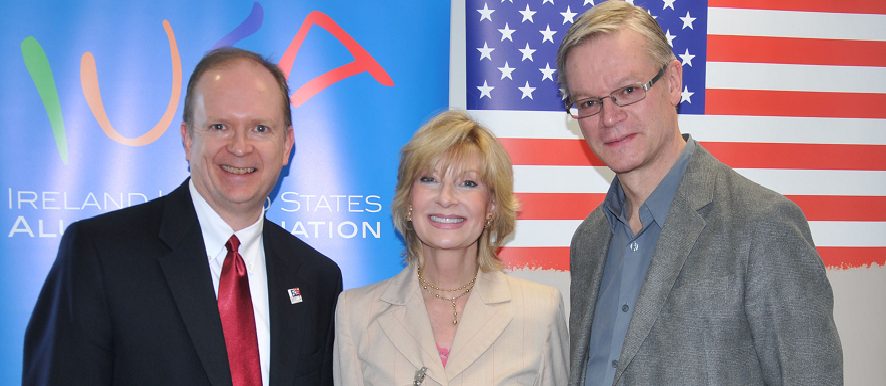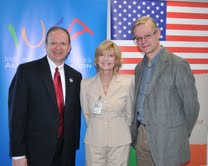“An féidir linn? Is féidir linn!”[1], says serial entrepreneur Chris Horn
Dublin, March 26th, 2012 – Serial Irish entrepreneur, Chris Horn, addressed members and invited guests of the Ireland United States Alumni Association (IUSA) gathered for a seminar on entrepreneurship in the modern Irish context, titled “Is Féidir Linn – Irish Chutzpah!”.
For all his impressive credentials, Chris Horn (biography below) is quite a down-to-earth and engaging individual. His made for quite a relaxed keynote speaker, with an approach that ditched scripted comments for a lively, audience-led question and answer session on the seminar theme. Questions covered such areas as advice for start-ups, what makes for an entrepreneur, funding new ventures, the differences between the Irish and US start-up funding environments, and the portrayal of entrepreneurs in the media.
Reflecting on his own experience, Chris proffered advice in a number of areas. He found having an experienced mentor on the board when starting up helped immensely with the learning curve. He now sees it as incumbent on successful entrepreneurs to act as mentors to others, in that sense paying back/forward.
When starting out, he also advised keeping business partners and social/life partners separate. While social/life partners provide great emotional support and encouragement, he cautioned it is best for them not to be directly involved in the business itself given the pressures and stresses of a start-up. Rather, he advised establishing a new venture with business partners with whom you are reasonably confident you can work through the myriad issues that will inevitably be encountered.
When it comes to what makes for an entrepreneur, one participant proffered that he had recently heard the age 59 to 64 as the most opportune period in one’s life to become an entrepreneur. Chris responded that he considered everyone has latent entrepreneurial potential and that it was a matter of society finding ways to best tap into that potential. Signalling his own bias in advance, he commented that an engineering degree serves as a solid base on which to build other skill sets, such as developing an understanding of business, economics and finance.
On funding new ventures, and prompted by a question asking if there was too much of a grant mentality towards funding start-ups in Ireland, Chris noted a distinct difference between the US and Ireland. While private venture capital is the norm in the US, such capital comes from both the private and public sectors in Ireland. Indeed, Chris quoted the Chief Executive of Enterprise Ireland as saying it is the largest venture capitalist in Europe. In many respects, Enterprise Ireland filled a void where private venture capital was next to non-existent.
However, he cautioned against Irish start-ups telling a US venture capital fund they have funding from a state organisation until a relationship has been established, as the US funds simply would not understand government involvement; they would think it somewhat reminiscent of communism and would be unlikely to invest. He also commented that the benefit of Enterprise Ireland as a venture capitalist is that it has the flexibility to take a longer term view, as opposed to private venture capital, which tends to seek a given return within a shorter timeframe.
In terms of helping start-ups become established, Chris noted another difference between the US and Ireland. Whereas US public sector procurement is a vehicle through which start-ups develop and build, public sector procurement in Ireland tends towards conservatism, with business going to more established companies. In the technology sector, for example, his sense is that this is because of high profile failures, such as the fallout from the health service PPARS (personnel, payroll and related systems) computer system, which has served to discourage the public sector from going with unproven suppliers.
Looking to Ireland’s future, Chris was a member of the Irish Government’s Innovation Taskforce, which reported in February 2010, and he was a member of the consequent Implementation Group to oversee execution of the Taskforce recommendations. This drew some questions, amongst which was one relating to how many of the recommendations had been implemented. He stated that some had been actioned and that he was in contact with the current Taoiseach and Minister for Jobs, Enterprise and Innovation with a view to encouraging implementation of those that remained.
Towards the end of the session, Chris was asked what he made of the portrayal of entrepreneurs in Irish media. He commented that the likes of Dragon’s Den, while serving a particular purpose and interest, did not reflect the story of entrepreneurship. Instead, he would like to see RTE, in its role as public service broadcaster, portray entrepreneurship stories through more of a focus on following entrepreneurs in their endeavours.
———-
Chris Horn’s Biography:
Graduated from Trinity College Dublin in 1978, and subsequently completed a PhD. In 1991, he co-founded and became CEO of IONA Technologies, which went public in 1997 in what was then the 5th largest IPO in the history of NASDAQ. Chris served as chair of various technology companies and Irish national policy groups and was the founding chair of the Ireland China Association and China Crest, a Beijing based consultancy business. He chaired various charities and institutes, such as: UNICEF Ireland; the Irish Brain Research Foundation; the Irish Management Institute; the Community Foundation of Ireland; the Dublin Chamber of Commerce e-City working group; and founding chair of the Government’s Expert Group on Future Skills. He has served on the IBEC national council and, separately, on ICT Ireland; the advisory board of the Department of Communications, Energy and Natural Resources for the nationwide provision of “open access” metropolitan area networks in towns and smaller cities; the board of Trinity College Dublin and, separately, its Foundation Board; the board of Science Foundation Ireland; and the business advisory board of Georgia Tech Ireland. He was President of Engineers Ireland, a member of the Irish Government’s Innovation Taskforce, an advisory group which reported in February 2010, and a member of the consequent Implementation Group to oversee execution of the Taskforce recommendations. He is currently involved with various companies and initiatives, and is chair of Cloudsmith, Gridstore, SophiaSearch, the Science Gallery, CTVR, and a board director and advisor to the World Irish project, an exciting initiative by John McColgan (of Riverdance fame) to link those interested in things Irish worldwide. He is an occasional opinion writer for the Irish Times.

